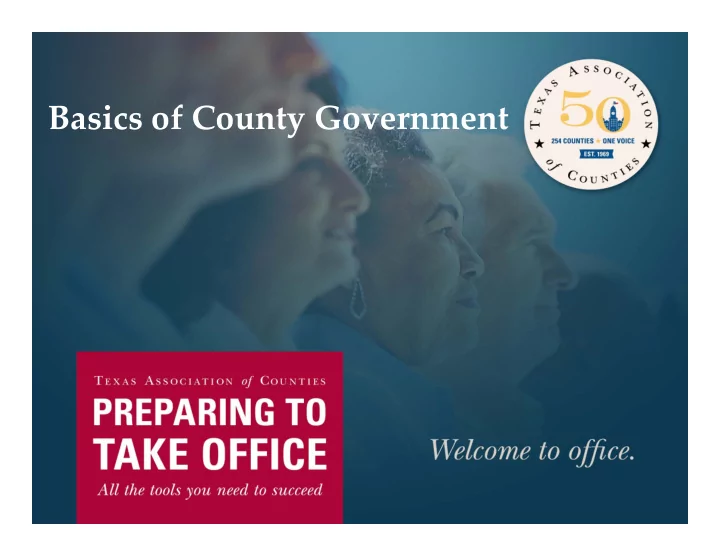

Basics of County Government
Why counties were created: Original purpose: Law & Order Designed to serve rural population Fear of government power Checks and balances
Structure of county government: Counties are political subdivisions of the state. Counties are extensions of state government at the local level. In 1920, the Supreme Court held counties to be an “instrumentality of the state” as opposed to a municipality. (Bexar County vs. Linden)
Texas Counties Basic Organizational Chart Voters District Judges Auditor County County District County Justices of Tax Commissioners Treasurer Sheriff Constables Clerk Judge Clerk Attorney Peace Assessor Commissioners Court
Commissioners Court • Sets the tax rate & adopts the budget • Makes or approves budgeted purchases • Establishes county investment policy • Incurs debt and determines how it will be repaid (often voter approval required) • Approves any contracts for the county
Commissioners Court • Responsible for providing buildings and offices for the county, including the jail • Designates office space • Exercises general control over all roads, highways, ferries and bridges • Fills vacancies in most county offices • Appoints members to various boards
County Commissioner The Precinct System Commissioner runs Road & Bridge Dept. in his/her precinct. The Unit System Commissioners Court hires engineer or administrator to run Road & Bridge Dept.
County Judge • Presiding officer of Commissioners Court • Budget officer (in counties under 225,000 pop.) • Judicial duties: typically, misdemeanor criminal and small civil cases, probate, juvenile cases, appeals from JP court • Head of emergency management and homeland security • Duties related to elections • Fills vacancy in office of Commissioner
County Auditor (Appointed Officer) • Appointed by District Judge(s) • Has financial oversight of all county offices • Establishes accounting procedures and conducts internal audits • Approves all county disbursements • Budget officer in counties with over 225,000 pop. (Counties over 125,000 pop. may opt for an appointed budget officer)
County Treasurer • Receives and deposits all county revenues • Disburses funds on order of Commissioners Court • Manages depository contract • Keeps record of receipts and expenditures
County Treasurer Tasks in Some Counties • County investment officer • Payroll and/or human resources officer • Employee benefits coordinator • Risk manager and insurance coordinator • Has some audit responsibilities in counties with no auditor
County Tax Assessor ‐ Collector • Calculation of taxes (effective tax rate) • Collection and reporting of property taxes • Motor vehicle licensing and registration • Voter registration (if county does not have an elections administrator) • May collect taxes for other entities • Misc. fees ( alcoholic beverage permits & others)
County Clerk Records • County budget and other Commissioners Court records, including its minutes • Clerk of County Court and County Court ‐ at ‐ Law • Real estate instruments • Bonds, marriage licenses, wills, births, brands, etc. Elections • Clerk typically has overall responsibility for elections (if county has no elections administrator)
District Clerk • Serves as custodian of records for district court • Coordinates jury panel selection process • Manages trust funds and court registry funds • Key player in the timely transfer of inmates out of county jails Combined County & District Clerk • Counties with less than 8,000 population may combine the offices
County Sheriff • Responsible for law enforcement • Manages and operates county jail • May serve as Tax Assessor ‐ Collector in counties with less than 10,000 population • Serves warrants and civil papers
Justice of the Peace • Hears the following types of cases: • Traffic and other Class C misdemeanor cases punishable by fine only • Civil cases with up to $10,000 in controversy • Landlord and tenant disputes • Performs magistrate duties • Conducts inquests
County Constable • Has statewide jurisdiction for criminal process • Has countywide jurisdiction for civil process • Serves as a licensed peace officer and performs law enforcement functions • Serves as bailiff of Justice Court
County Attorney • Prosecutes misdemeanor cases • Upon request by a county official, provides opinion about the official’s duties of office • Represents the state in removal actions • Brings civil enforcement actions on behalf of state or county • Not required to represent county if county is sued
District Attorney • Paid by state of Texas • Represents the state in criminal cases • Presents cases to the Grand Jury • Prosecutes felony cases • Duty to “see that justice is done”
Criminal District Attorney • Has the responsibilities of both county attorney and district attorney • Is paid by state of Texas
Other Important Positions Human Resources Manager Loss Control Coordinator Purchasing Agent Emergency Management Coordinator Information Technology (IT) Manager Veterans Service Officer
Each county official has a “Sphere of Authority”
Commissioners Court Controls the Budget
How it Works • Each office’s operations is governed by a variety of laws • Each elected official has exclusive authority over the office’s operations and employees • The commissioners court typically controls the budget • Some county duties can only be performed if elected officials choose to cooperate
The Bottom Line Commissioners Court cannot use its budgetary authority to prevent an officer from performing his/her required duties.
County Government Rule No. 1: IT’S EASIER IF WE ALL PULL TOGETHER
Recommend
More recommend